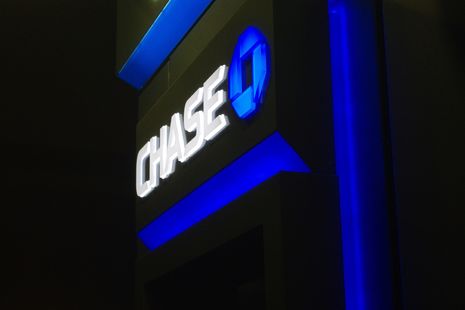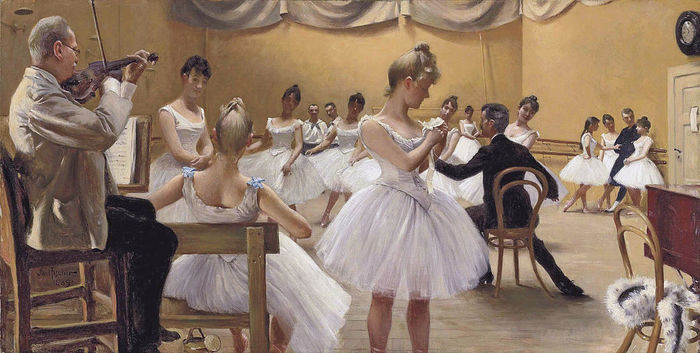Burning banks: Alex Schaefer and American culture shocks
Talia Jacobs considers her American research trips through the prism of Alex Schaefer’s ‘Chase Burning’ paintings

On first arrival at my hotel in Bloomington, Indiana, home to Indiana University’s Lilly Library, I found myself stationed directly opposite a Chase Bank. Bleary-eyed following sixteen hours of travelling on a singular hour of fitful sleep, and almost empty-handed due to the “misplacement” of my baggage by American Airlines, the first thing I wanted to do was to get into bed, forget the stress of lost belongings, and fall fast asleep. Yet, opposite such a distinctly American sight – the very picture of capitalist individualism, all glass and steel and low, flat roofs – all I could think of was the series of 2009 to 2011 paintings made by Alex Schaefer of various Chase Banks up in flames.
The thought sounds a little threatening. Schaefer himself has been questioned on at least two occasions for suspicions on domestic terrorism, based solely on his paintings. The last thing I want to risk by writing such an article is getting into trouble with the ever-tightening immigration policies of the United States before I get back to Britain. Really, I think the thought came to me in a moment of irony. It is difficult not to be a little miffed by the blank faces and nonchalance of airport staff who can only tell me that they don’t know where my suitcase is with what seems to me a shrugging indifference – be sure, I use the Britishism with complete intentionality. Perhaps even more so, it stood out to me for its stark visuals, which seemed to testify to the volcanic economic and political turmoil enacted by President Trump’s tariffs. Schaefer’s work has been cast as eerily representative of the wildfires which recently waged across his native California, yet it is primarily to the domineering aspect of what he calls ‘Disaster Capitalism’ that the artist draws attention to: “The flames symbolize bringing the system down. Some might say that the banks are the terrorists.”
“It stood out to me for its stark visuals, which seemed to testify to the volcanic economic and political turmoil enacted by President Trump’s tariffs”
Schaefer’s series of banks up in flames only worked to further my first impressions of a United States not catered to tourism; namely, that this is a country individualistic to the point of brutality. I suppose the first thing that truly shocked me was the sheer scale of everything – the size of the roads, the number of retail parks, the personalities, not to mention the portion sizes. This was certainly not the ‘walkable city’ so many Americans can only chase on so-called ‘Euro-summers’. It felt less like a place designed for people than for cars alone, or maybe for lone pioneers still nursing the myth of the frontier. The scale wasn’t just physical – it was ideological. American flags stand outside every restaurant, every street corner, not to mention the Chase bank I pass on the way into campus. Taxi drivers truly do blare good-ol’ American country music and roadside hoardings tout the almost unbelievably cheap glory of homegrown fast food, as if freedom itself were deep fried and served with a side of ranch. Every oversized pickup truck and endless strip mall seemed to echo a silent mandate: take up space, fend for yourself, trust only your own bootstraps.
“Taxi drivers truly do blare good-ol’ American country music and roadside hoardings tout the almost unbelievably cheap glory of homegrown fast food, as if freedom itself were deep fried and served with a side of ranch”
Even in the Midwest, where friendliness is the prevailing stereotype, there’s a willing guardedness, a kind of emotional zoning ordinance. People greet you warmly, then quickly retreat, their lives tucked away behind garage doors and front lawns trimmed into submission. It’s not hostility – it’s a fierce commitment to privacy, to autonomy, to not needing anyone. Perhaps it’s naivety, or a kind of transatlantic ignorance, but to a young girl travelling alone halfway across the world, that commitment can feel both impressive and quietly devastating. It is hard not to read something cataclysmic into Schaeffer’s art every time I pass one of those cold, imposing banks. I find it almost necessary to remind myself that his symbolic representation of a systematic collapse, paintings of such isolated intensity, work to function against the catastrophe the United States finds itself in. Paint itself is a perfect medium to capture such intensity, as Schaeffer himself attests: “Fire works great with paint […] that’s why [J. M. W.] Turner painted seascapes and raging storms and clouds.” Schaeffer envisions futures of collapse which he wills us to embrace. That art must constantly work to assert its place in the American ‘culture wars’ has never been so clear to me.
The Midwest had always seemed to me some distant maze of small-town America, and certainly not the first place I’d cross the Atlantic for. Yet it was here I was offered a fellowship to study the papers and manuscripts of Sylvia Plath. Writing part of my dissertation on Plath, and proudly bearing the torch of literary Newnhamite after her, was the stuff of dreams. Truly, it was within the university, the limestone beauty of the really quite impressive campus (yes, even in comparison to the ancient spires of Cambridge!) that I found the connection across eras you inevitably search for in any archive.
This is the image of the Midwest I want to come away with. Not the banks with their immobilizing of individual growth, nor the politics which, in Schaefer-style, can only be described as flaming and incendiary. I want the one that fosters opportunity and exploration. Indeed, without the generosity of the Lilly Library, I would not be sitting here writing this article 4000 miles away from Cambridge. And I suppose I ought to give the airline more credit – with their eventual location and return of my luggage a few days ago, I was happily reminded that with a little patience, and a willingness to rely on the help of strangers, things do eventually fall into place.
 News / Judge Business School advisor resigns over Epstein and Andrew links18 February 2026
News / Judge Business School advisor resigns over Epstein and Andrew links18 February 2026 News / Hundreds of Cambridge academics demand vote on fate of vet course20 February 2026
News / Hundreds of Cambridge academics demand vote on fate of vet course20 February 2026 News / Petition demands University reverse decision on vegan menu20 February 2026
News / Petition demands University reverse decision on vegan menu20 February 2026 News / CUCA members attend Reform rally in London20 February 2026
News / CUCA members attend Reform rally in London20 February 2026 News / Caius students fail to pass Pride flag proposal20 February 2026
News / Caius students fail to pass Pride flag proposal20 February 2026










